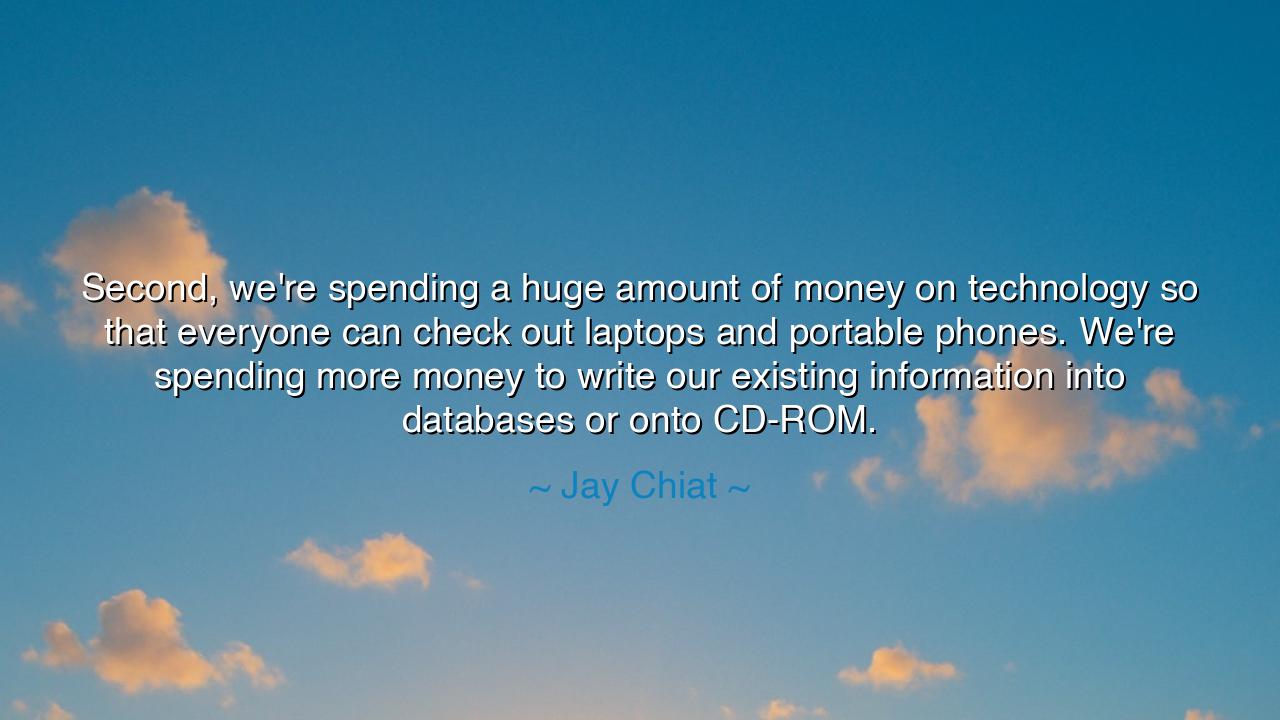
Second, we're spending a huge amount of money on technology so
Second, we're spending a huge amount of money on technology so that everyone can check out laptops and portable phones. We're spending more money to write our existing information into databases or onto CD-ROM.






The words of Jay Chiat, “Second, we're spending a huge amount of money on technology so that everyone can check out laptops and portable phones. We're spending more money to write our existing information into databases or onto CD-ROM,” speak as a marker of a time when the world stood at the threshold of a new era. His voice captured the birth pangs of the digital age, when men and women began to trade paper for screens, and fleeting memory for the permanence of electronic storage. In these words lies both excitement and caution, for they reveal the price of progress—a great outpouring of wealth and energy to harness the future.
The origin of this quote lies in the 1990s, a period of great transformation. Chiat, a pioneering figure in advertising, was among the first to foresee that the tools of communication would be reshaped by technology. To him, laptops, portable phones, and databases were not toys but weapons in the battle of ideas and commerce. The mention of CD-ROMs reminds us of the moment when knowledge was being painstakingly transferred from fragile paper into digital vaults, so it might endure and be shared with greater speed. His words capture the spirit of pioneers who must labor and invest heavily in the foundations before others can build upon them with ease.
History offers echoes of such transformation. Think of Gutenberg, who in the fifteenth century poured his fortune and years of toil into the invention of the printing press. At first, the cost was immense and the returns uncertain, but from his sacrifice came a revolution that spread literacy, learning, and the written word to every corner of the earth. In the same way, the investments Chiat spoke of were not merely expenses; they were seeds sown into the soil of the future, whose fruits we harvest today in the vast digital networks that unite humanity.
Yet the heart of Chiat’s message is not only about money or machines, but about the willingness to embrace change. Every age has those who cling to the past, fearful of what is new. But progress demands courage: to invest when outcomes are uncertain, to labor for the benefit of those who will come after, and to believe that knowledge preserved and communication expanded will uplift the human race. His words remind us that the greatness of a generation is measured not by what it keeps for itself, but by what it builds for the future.
One may see a modern parallel in the rise of the internet itself. In the beginning, governments, universities, and visionaries poured vast sums into cables, satellites, and servers, though the ordinary person saw little benefit at first. But in time, the world was transformed: a farmer in a remote land could check weather forecasts, a student could access libraries once locked behind walls, and families separated by oceans could speak as if across the table. Such is the power of great investment in technology—what begins as burden soon becomes blessing.
The lesson for us is clear: do not begrudge the costs of growth, whether in wealth, effort, or patience. What seems heavy in one season may become light in the next, and what feels like sacrifice may become the very foundation of abundance. Just as Chiat’s words reveal, to digitize, to connect, to modernize was not cheap, yet it was necessary for the flourishing of future generations. In your own life, too, there are moments where you must sow heavily before you reap. Do not shrink from them.
Practical action lies within reach. Be willing to invest in learning, in tools that expand your ability, and in efforts that safeguard knowledge for others. Preserve the stories of your family, write down your wisdom, store your work so that it may not vanish with time. Use technology not as a master but as a servant, always remembering that its true purpose is to connect human hearts and minds. In this way, you continue the legacy of those like Chiat, who saw beyond the cost and beheld the promise.
Thus, let us remember: technology is not merely wires and machines, but the bridge between generations. The wealth spent is not wasted, for it buys continuity, memory, and possibility. As Chiat foresaw, the investment of one age becomes the inheritance of the next. May we, too, be builders of such bridges, leaving behind not only tools, but the wisdom to use them well.






AAdministratorAdministrator
Welcome, honored guests. Please leave a comment, we will respond soon